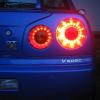Anyone With Info On How To Clean Afm?
Announcements
-
Similar Content
-
Latest Posts
-
Was that also a typo? $350?! Just typing "BMW oil level sensor" and prices start out a lot more sanely than $350. I'm guessing it's a sensor used in one low volume model only or something?
-
They kept the product number the same, so we "didn't pick it up when packing your order". If you packed the order, you clearly saw the box wasn't Hella...
-
Actually, the equivalent skyline part is both cheaper and simpler, maybe you should come back from the dark side?
-
And we are full
-







Recommended Posts